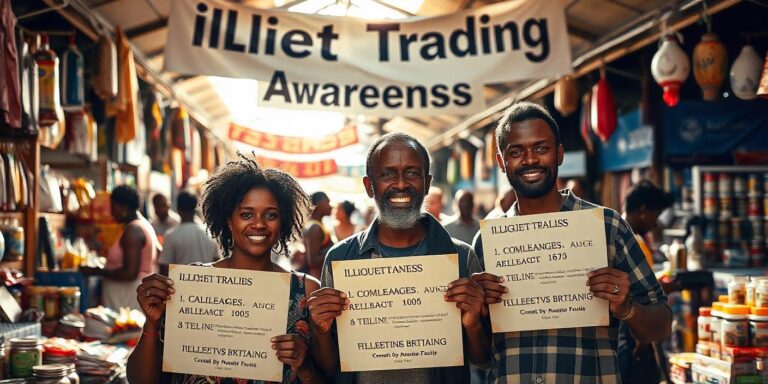Johannesburg, 11 November 2024 – South Africa is facing an increasingly worrisome crisis of the production, sale and consumption of illicit and counterfeit food products which have regrettably caused illness and also resulted in fatalities, including of children. In response, the Consumer Goods Council of South Africa (CGCSA) has today launched a national illicit awareness campaign using the tag line, “Checka daai ding, Reka Makoya!” whose main focus is to transform the public from being passive consumers into becoming vigilant buyers who can identify and reject counterfeit products.
But it’s not just about educating but also alarming consumers to play an active role in curbing the spread of illicit goods, helping protect their communities and contribute to building safer, more trustworthy markets for all. Ultimately, CGCSA hopes this campaign will empower consumers with knowledge to identify counterfeit goods, to protect themselves against the dangers of illicit products, and also encourage them to use the CGCSA toll-free Hotline 0800 014 856 to report the trading of illicit and counterfeit goods.
Zinhle Tyikwe, CGCSA CEO says this outreach will educate the public about the dangers of food fraud, counterfeit and illicit products and what key information to look for during their shopping and on pack.
“We also want to restore the trust of people in locally manufactured and legitimately imported products. Our food manufacturing and retailer members are keen to protect the safety of consumers when they buy food products. CGCSA is noticing an increase in calls received through our hotline 08001 4856 which in the main include reports on sale of expired goods. The Consumer Goods Crime Risk Initiative (CGCRI) division of the CGCSA is assisting authorities, particularly law enforcement, to address this public health matter and these alerts from the community help. We urge the public to report any suspicious activities relating to illicit, counterfeit and food fraud.”
The CGCSA is continuing to collaborate with brand owners to adopt and use approved barcodes through GS1 South Africa (Global Data Synchronisation Network, 2D Barcodes, Verified by GS1). Products made or packaged in South Africa usually have barcodes starting with “600,” thanks to GS1 South Africa. However, products from other countries will have different barcode numbers.
This is because GS1 Global, manages a global identification system for trade items based on unique numbering. The unique numbering is obtained through the use of unique prefixes (starting from 0 to 9), with each of GS1’s 118 national member organisations having their number range (starting with a country prefix) under which the unique barcodes are issued. South Africa, through GS1 South Africa has prefixes of 600-601. So, just because a barcode doesn’t start with “600” doesn’t mean the product is fake or illegal. For example, companies in the UK have prefixes that start with 500 – 509 to confirm which country codes belong to which country visit this link https://www.gs1.org/standards/id-keys/company-prefix
The CGCSA is launching the MyCGCSA App, which will help consumers verify products they buy, whether from big stores, online, or informal markets. The App will confirm if a product is genuine or raise suspicion, prompting consumers to report the suspicious product. CGCSA has already been training law enforcement on how to use the App to identify key product data as enabled by GS1 standards to secure the food supply chain to ensure the integrity of the supply system from manufacturers to retailers and small businesses.
So far, over 300 SAPS and Environmental Health Professionals have been trained on how to use the App. Furthermore, over 600 informal traders working in the taxi ranks vicinities have been trained in collaboration with the W&RSeta.
Tyikwe says the CGCSA believes the recent incidents of consumption of food contaminated with chemicals reinforce calls that have repeatedly been made by the food and agriculture sector for the government to establish a single agency to enhance food safety regulations enforcements. Among other activities, the agency would provide a coordinated and structured approach to all matters relating to food safety.
“We need a multi-stakeholder approach to address this problem as it has both public health safety and economic implications for the country. The integrity of the food supply chain, from manufacturers to the retail shelves, is of critical importance in terms of food safety and the health of the consumers. We therefore cannot stress enough the critical need for a coordinated approach to addressing the prevalence of illicit and counterfeit food products which the government has since declared a national security issue.
We invite members of the public to join the collaborative effort by downloading the MYCGCSA App and also reporting suspicious or illicit products through our hotline 08001 4856” concludes Tyikwe.
End
About the Consumer Goods Council of South Africa
The Consumer Goods Council of South Africa (CGCSA) is an industry association representing over 9 000-member companies in the Consumer Goods, Retail and Services sector, which is one of the largest employers, at over 20% of South Africa’s total formal workforce and contributes over 20% of the country’s GDP. At the core of CGCSA’s purpose is our vision to become the leading Consumer Goods industry platform for advocacy, collaboration and best practice in South Africa and across Africa

